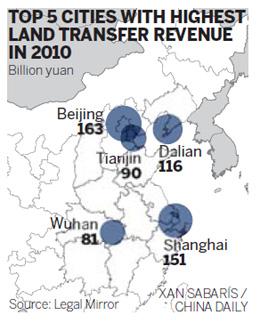More land will be made available as ministry fights to keep down prices

BEIJING - The man in charge of China's top land watchdog pledged on Friday to continue to carefully manage the availability of building plots in an effort to curb soaring property prices.
Xu Shaoshi, the minister of land and resources, said at the ministry's annual working conference in Beijing that the strengthening of control over the property market was top of his agenda.
According to the latest statistics from the ministry, property developers spent 2.7 trillion yuan ($407 billion) on land transactions in 2010 - a year-on-year increase of 70 percent.
"That figure suggests urban development is becoming more dependant on land transactions, which has triggered an uneven allocation of benefits - and social conflicts," Xu said.
The Ministry of Land and Resources will try to mitigate the problem by making more land available through the reclamation of idle land. It will also name and shame developers who engage in illegal behavior, such as land hoarding. Xu said such illegal activity will be subject to stricter punishments this year.
Planned land supply in 2010 reached 180,000 hectares on the mainland, up 80 percent from actual supply in 2009.
Xu said the ministry will guarantee that there will be enough land available in 2011 for the construction of 10 million affordable homes.
He said land set aside for affordable housing, for the rebuilding of shanty areas and for owner-occupied small- and medium-sized homes will account for at least 70 percent of the total land supplied.
During the 11th Five-Year Plan (2006-2010), more than 2.2 million hectares was earmarked for construction, including 45,333 hectares of land for affordable housing. During that period, the country's land transfer fees reached more than 7 trillion yuan, according to statistics from the ministry.
The minister added that China will further improve its land auction mechanism and find other ways to transfer the ownership of land as well as expand the catalogue of land.
Although the government took several steps to cool the housing market in recent months, it has remained hot throughout the past year.
Xu said land supply was increasing during the first three quarters of 2010 and the cost of land had been holding steady. However, in the last quarter, both the cost of land and supply were increasing, challenging the government's housing control policy.
House prices in first-tier cities increased dramatically, with Beijing topping the list of cities with the fastest-increasing housing prices. The cost of real estate in the capital rose by about 42 percent on the price in 2009, according to the latest statistics from the China Real Estate Information Corporation on Wednesday.
The average housing price in Beijing reached 26,599 yuan per square meter in December, which was about 12.6 percent more than it was in November, according to the Beijing Municipal Commission of Housing and Urban-rural Development.
Land transfers in Beijing alone reached about 163.67 billion yuan in 2010.
In light of the fast-rising property prices, some developers have been bracing for stricter measures to cool the real estate market.
Ren Zhiqiang, chairman of the Beijing-based Huayuan Real Estate Co Ltd, said on his blog that the strict control of the real estate market will continue in 2011 because public welfare, including the construction of affordable housing, is part of the central government's agenda.
Premier Wen Jiabao said in November that the government was determined to pull housing prices back to a reasonable level.





